Term Page
U Visa/T Visa/VAWA 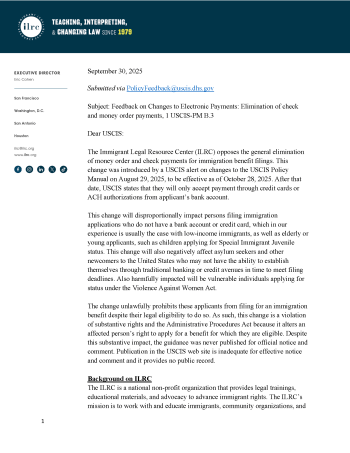
The Immigrant Legal Resource Center (ILRC) opposes the general elimination of money order and check payments for immigration benefit filings. This change was introduced by a USCIS alert on changes to the USCIS Policy Manual on August 29, 2025, to be effective as of October 28, 2025. The new guidance states that all applications filed October 28, 2025, or after must pay by ACH bank account payment, credit or debit card, or pre-paid card. No bank checks, certified checks, personal checks or money orders will be accepted thereafter.
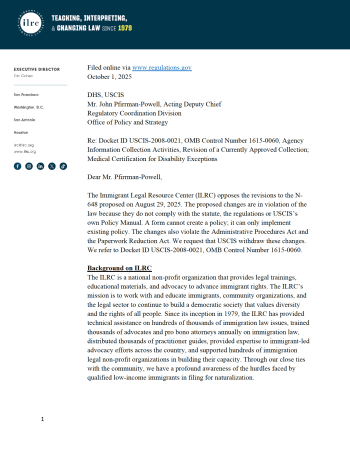
On September 30, 2025, ILRC submitted this comment to USCIS to oppose the proposed changes to the N-648 and request that they be withdrawn. The changes create a series of substantial obstacles for naturalization applicants applying for a disability waiver of the English/civics requirement. The proposed changes create a form more than twice the length (10 pp.) of the current form (just over 4 pp.) that creates an undue burden on applicants and the medical professional who must complete the N-648. It also doubles the burden of time for USCIS adjudicators who must review this form.
The barrier that these changes would pose is prejudicial to eligible waiver applicants. Standards expressed in the revised form are outside any guidance provided by the statute, regulations and USCIS Policy Manual. The form purports to create law and invents barriers to eligibility in areas where no such law has been established by legitimate guidance.
The barrier that these changes would pose is prejudicial to eligible waiver applicants. Standards expressed in the revised form are outside any guidance provided by the statute, regulations and USCIS Policy Manual. The form purports to create law and invents barriers to eligibility in areas where no such law has been established by legitimate guidance.
On July 16, 2025, ILRC submitted a comment opposing a new U.S. Citizenship and Immigration Services (USCIS) policy that allows the agency to use “derogatory information” against immigration applicants without always disclosing it.
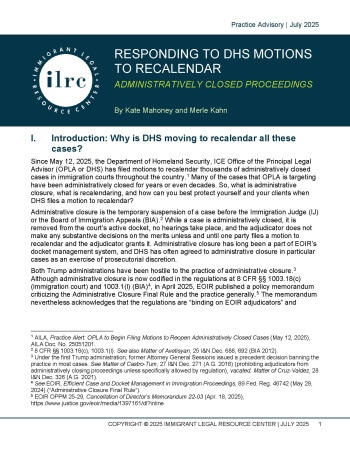
In recent months, the Department of Homeland Security has begun filing thousands of motions to recalendar administratively closed proceedings. This trend is raising questions about how attorneys and accredited representatives can respond to these motions and protect their clients’ interests, particularly in cases that have been administratively closed for many years. This advisory explores those questions and offers strategy considerations when determining how to proceed in each case.
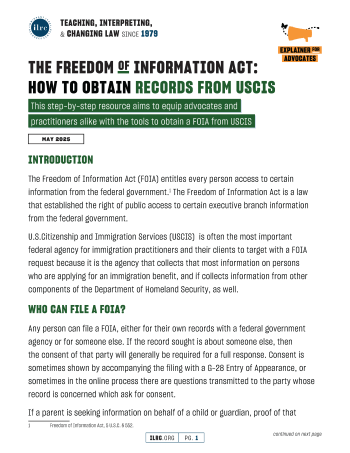
The Freedom of Information Act is a law that established the right of public access to certain executive branch information from the federal government. This step-by-step guide helps advocates and community members better understand how to make such requests to attain data about themselves or others from USCIS.
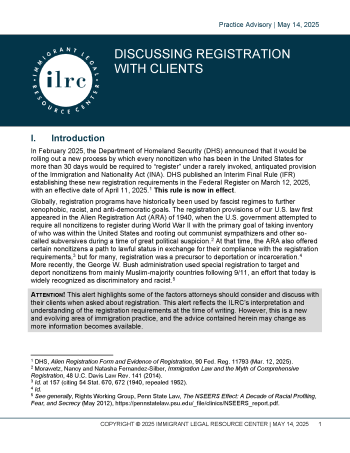
On April 11, 2025, the new Form G-325R took effect as a general tool to register all previously unregistered noncitizens under an antiquated and rarely invoked provision of the Immigration & Nationality Act, with criminal penalties for willful failure to register. This advisory was written to assist attorneys in discussing registration and the new Form G-325R with clients, including screening for prior registration and assessing the potential consequences of registering or not registering, so that individuals can make informed decisions about how to proceed in light of this new rule.
The Trump administration’s Registration requirement for most undocumented immigrants is another hateful tactic in its campaign to cause panic and fear throughout the country. The Department of Homeland Security (DHS) has been clear that the central purpose of Registration is to gather information about all noncitizens and use this information to locate, apprehend and remove them as quickly as possible. The new registration requirement took effect April 11, 2025.
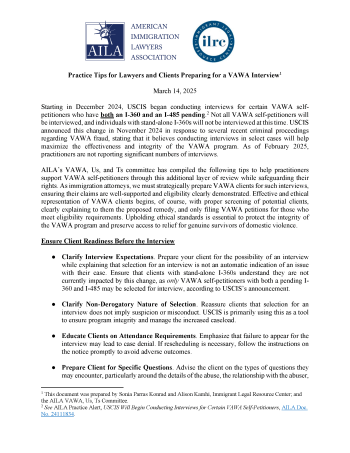
Starting in December 2024, USCIS began conducting interviews for certain VAWA self-petitioners who have both an I-360 and an I-485 pending. ILRC and AILA’s VAWA, Us, and Ts committee compiled tips to help practitioners support VAWA self-petitioners through this additional layer of review while safeguarding their rights.
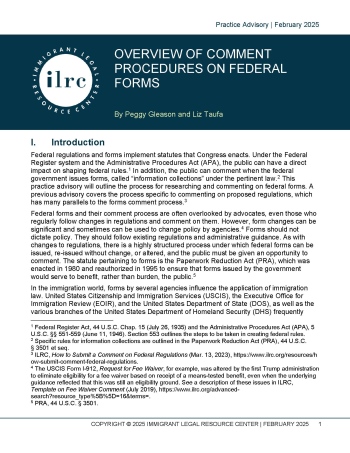
This practice advisory outlines the process for researching and commenting on federal forms. A previous advisory covers the process specific to commenting on regulations, which has many parallels to the forms comment process. Federal forms and their comment process are often overlooked by advocates, even those who regularly follow changes in regulations and comment on them. However, form changes can be significant and sometimes can be used to change policy by agencies. The statute regulating forms is the Paperwork Reduction Act (PRA).
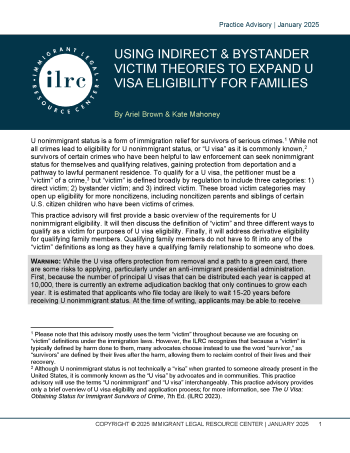
Eligibility for U Nonimmigrant Status, commonly known as the “U Visa,” hinges on whether the applicant has been the “victim” of a qualifying crime. The regulations implementing the U visa statute contemplate three categories of “victims” who may qualify for the U visa: direct, bystander, and indirect victims. This practice advisory provides a basic overview of the requirements for U nonimmigrant eligibility. It then discusses the definition of “victim” and three different ways to qualify as a victim for purposes of U visa eligibility. Finally, it addresses derivative eligibility for qualifying family members.